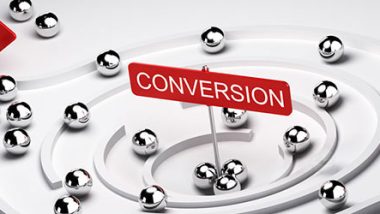Landing pages are one of the cornerstones of lead generation. While their importance cannot be overstated, many marketers still get the fundamentals wrong.
There are two major challenges when trying to effectively deploy landing pages for lead generation.
The first challenge – landing pages are everywhere.
Millions of websites have pop-up forms, landing pages (or squeeze pages), etc. Internet users are relatively numb to them, and are now savvier and can recognize a ‘bribe’ when they see one.
People more reluctant to opt-in because they understand that it means more marketing emails inundating their inbox.
The landing page bar has definitely been raised.
So, you’ll need to step up your game if you wish to convert visitors into subscribers… which brings us to the second challenge – improving your conversions.
Thankfully, there are a few steps you can take to increase your conversions and turn your landing page into a lead-generating machine.
1. Simplicity is the ultimate sophistication
The less you have on your landing page, the better.
It may seem counterintuitive. After all, you’re trying to build trust and ‘encourage’ the visitor to sign up. Yet, tests have repeatedly shown that all a landing page needs are a strong headline, an attractive freebie, and a simple design.
If you’re using images, it’s best to stick to 1 or 2 at most. Bullet points (if used) should not exceed 5.
Most importantly, keep your form fields to a minimum.
Asking for their name and email will suffice. The more details you ask for, the lower your conversions will be. People are reluctant to divulge their phone numbers, addresses, etc. to an online entity that they’re unsure of.
2. Above the fold
‘Above the fold’ on a website refers to the upper half of the page that’s visible without you having to scroll down. Ideally, your headline and form field/s should all appear above the fold.
The moment visitors need to scroll down the page to opt-in, you’ll be adversely affecting your conversion rate. You want to make it as easy and obvious as possible for people to sign up to your list. Don’t make them work for it.
3. Fast loading pages
We live in a world of instant notifications and Netflix. People want things FAST… even if that means the complete 16-episode season of a TV show dumped upon them all at once for them to binge-watch quickly.
This level of impatience was unheard of just 2 decades ago, but it’s the norm now.
What does that mean?
It means that if your landing page loads slower than a turtle with arthritis, visitors are just going to click off the page and go somewhere else.
Your landing pages need to be lightning fast. So, you’ll want good web hosting such as Siteground.
Alternatively, you could use page builders such as Leadpages or Systeme which are fast and also hosted solutions.
Whichever way you go, always remember – speed is everything. You can check how fast your page loads here: https://developers.google.com/speed/pagespeed/insights/
4. Mobile-friendly
With most of us glued to our mobile phone screens and surfing the net at all times of the day, it goes without saying that your landing page needs to be optimized for mobile.
You can check your page’s performance on mobile devices here: https://ready.mobi/
5. Congruence
If you’re using paid ads and directing the traffic to your landing page, there must be congruence between the ad and your landing page. The colors and fonts used should be similar, and what’s mentioned in the ad should be reflected in your landing page too.
This will ensure that the visitor goes through a seamless process that feels natural – rather than going from an ad which looks unique to a landing page which is jarringly different from the ad.
6. No external links
The only links on your landing page should be to your privacy policy and maybe another legal page such as your terms of service. These links should be at the bottom of the page and in a smaller, less obtrusive font size.
As mentioned earlier, your landing page only has one objective – to turn visitors into subscribers.
If you have links pointing to your blog or other pages, a percentage of your subscribers may click on these links and disappear down the rabbit hole without ever subscribing to your list. Definitely a no-no.
7. Strong headline and a call-to-action
Your headline will determine just how effectively your landing page converts.
It should be concise and about 8 to 10 words long. The headline should be benefit-driven and hint at the amount of value the subscriber is getting for ‘free’.
If you can speak in the visitor’s language and address their deep-seated concerns in your headline, you’ll have a winning landing page.
Don’t forget – you need to tell your visitor what to do. Have a call to action above the form button or on the button itself (E.g., ‘Get Access Now!’ or ‘Sign Up Here!’).
8. Test everything
Most companies don’t have winning landing pages right out of the gate. They keep testing and iterating until their conversions are high.
With constant A/B split testing and watching the analytics, you’ll be able to see which landing pages are performing better and keep those. Discard what doesn’t work.
Test the headline, the fonts, the colors, the images (if any), the call-to action, etc. Test all the variables, but only test one variable at a time so you know specifically which one is making the difference.
9. Know your audience
When it comes to landing pages, there is no one-size-fits-all.
Even in a specific niche, there will be different audiences with different needs. For example, weight loss for women above 40 is a specific niche.
However, some women may be stay-at-home moms while others are busy career women. Some may be obese while others are trying to lose just 10 pounds. Some may prefer yoga while others like running.
So, if you’re targeting these different audiences, you’ll need different landing pages that speak to them directly. Your headlines will need to be different. For example…
“7 Weight Loss Tips for Stay Home Moms!”
“10 Diet Secrets for Busy Women!”
“Stop Running! It’s Easier to Lose Weight with Yoga!”
3 different headlines for 3 different landing pages. All targeting women above 40 who are trying to lose weight, but have different needs.
Does this require more work on your part? You bet. But this extra effort will skyrocket your conversions and reap rewards many times over.
10. A decent ‘Thank You’ page
Last but not least, once a visitor signs up, they should be taken to a thank you page which lets them know that their free gift has been emailed to them.
Or ask to click on the email confirmation link which was just sent to them. Or say, “Thanks for signing up!”
What matters is that you tell them what they need to know, and this will reassure them that their action (signing up) was acknowledged.
Apply the 10 pointers above and your landing page will be a lead-generating force to be reckoned with.



